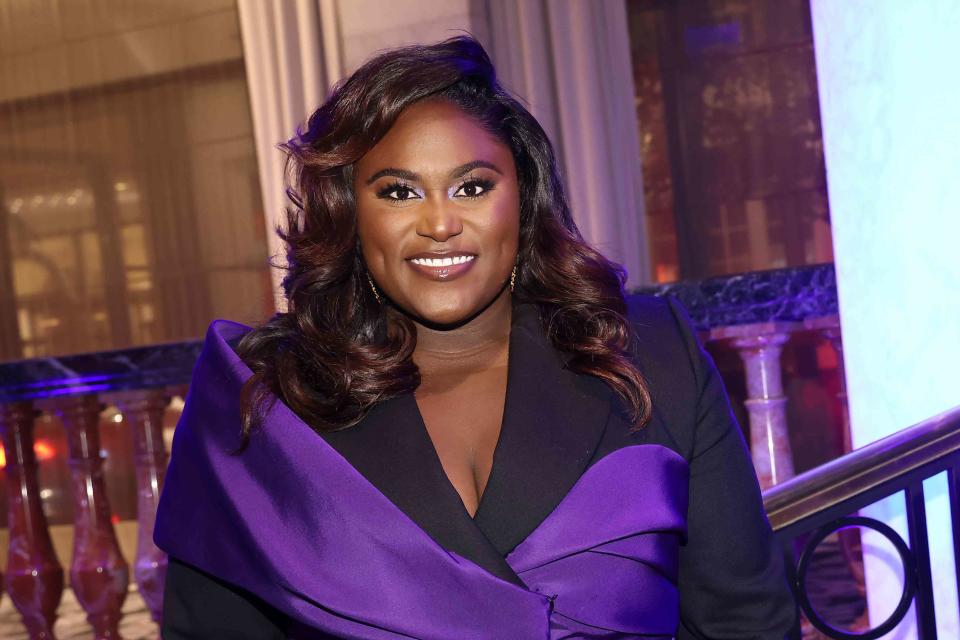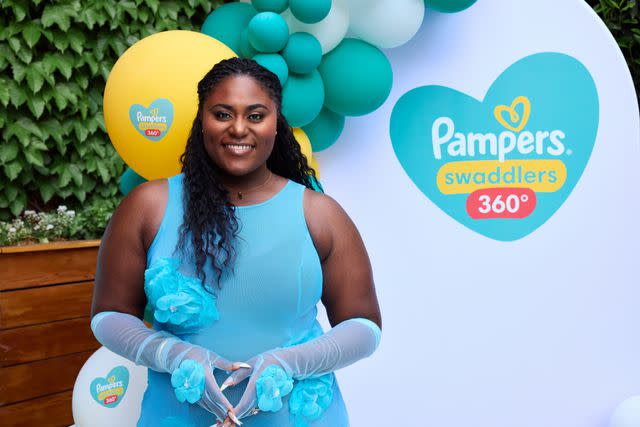Danielle Brooks Says Becoming a Mom Helped Heal Her Relationship With Her Own Mother: ‘I Was Able To Forgive and Understand Her'
- Oops!Something went wrong.Please try again later.
'The Color Purple' star partnered with Pampers and opened up about how motherhood changed her.

GettyImages/Variety/Contributor
Fact checked by Sarah Scott
Professionally, Danielle Brooks is having a year many actors can only dream of. The 34-year-old was nominated for best supporting actress for her role as Sofia in The Color Purple. It also earned her a Tony nomination, making her the second Black woman to ever land both.
She also received some well-deserved praise from her biggest fan—her daughter, Freeya. The 4-year-old, says Brooks, loves kissing a movie poster featuring her famous mom.
For Brooks, who initially worried how motherhood might impact her career, it’s a perfect compliment. It’s also a good lesson on work ethic she’s passing on to her daughter whom she shares with husband Dennis Gelin.
In their home, lessons are important. Along with trying to teach her daughter to sit down when she should, jokes Brooks, she also wants her daughter to be free. It’s the special meaning behind her name, after all.
“I don't ever want us to pop her bubble or kill her spirit,” says Brooks, who partnered with her favorite diaper brand, Pampers, to promote the Pampers Swaddlers 360. “That's the thing that is so important for me, to keep that innocence and joy in her heart as long as we can, but also prepare her for the world.”

Pampers
Brooks and her husband are also teaching their little one about stranger danger and how to handle emotions. “Learning how to breathe through those moments when you’re mad,” she explains. They sing a song from Daniel Tiger's Neighborhood together as a reminder: “When you feel so mad that you want to roar, take a deep breath and count to four.”
The Orange Is the New Black star is also a fan of using an emotions chart, which has pictures of various feelings to help Freeya learn how to identify them. At night, Brooks makes it a point to have a conversation with her daughter on how she’s feeling.
“Sometimes she says, ‘Mommy, I'm mad.’ And I'm like, ‘Why are you mad?’ ‘Because I didn't get all my stars today.’ ‘Why didn't you get all of your stars?’ ‘Because I didn't make my bed.’ ‘Well, how can we do it better tomorrow?’” shares Brooks on what their conversation might look like.
But Freeya isn’t the only one learning lessons. Brooks says parenthood has shifted everything, including her spending, body, and personality.
“Man, I've changed a lot,” she says. “Right when I had her, I was like way more chill than before because I had bigger battles to fight than the little ones that I thought were so big in my personal life before."
One thing she’s learned to let go of is promptness.
“I’m a Virgo, right? So, I have to be on time for everything. And when you have a child, that just doesn't happen,” says Brooks. “I had to surrender to the fact that I'm not going to be on time and instead of panicking, I'm going to be chill about it and accept that this is how things will be, and life will move on, and be OK.”
Learning to embrace changes and view them in a positive way is something Brooks is hoping to help her daughter with, too.
"Allowing her to know early that there will be shifts in her life—if I could help her with that, I would feel like the best mom ever,” she says. “I think that's why so many times, even as teenagers, we get so riled up because we need somebody to tell us we’re in this phase in our life and that phase is exactly where we’re supposed to be; you're supposed to be uncomfortable. That's the same thing when you're stepping into motherhood.”
The actress learned early on about how uncomfortable parenting can be. She’s been open about dealing with a frightening labor experience where she was told her baby was “flatlining” before having an emergency C-section. She also struggled with postpartum depression, a condition that impacts about 1 in 8 people.
Working out helped her. “The anger that I might have felt from the things that I was experiencing, I was able to put that into something healthy,” she says.
She also relied on her tribe. “Women that I could pray with and talk to and say, ‘Hey, are you feeling the same way?’” says Brooks. “It really helped to have a sisterhood of women I could call at two in the morning that I knew would pick up the phone.”
One relationship that was truly valuable was the one she had with her own mother. During her teen years, Brooks says she and her mother had a push-pull dynamic because they didn't see eye to eye. They began healing after Brooks gave birth in 2019.
“It wasn't until I became a mother myself that I realized that was just her way of protecting me. Once I was able to look at it like that, I was able to forgive and understand her, where she was coming from, and the skills that she had at the time, and that we’re human,” says Brooks. “I just knew that I wanted to make sure that that relationship was tight and we healed from things and we were able to truly love each other so that now I can have the best tools to raise Freeya without holding on to old stuff from how I was raised.”
For more Parents news, make sure to sign up for our newsletter!
Read the original article on Parents.

